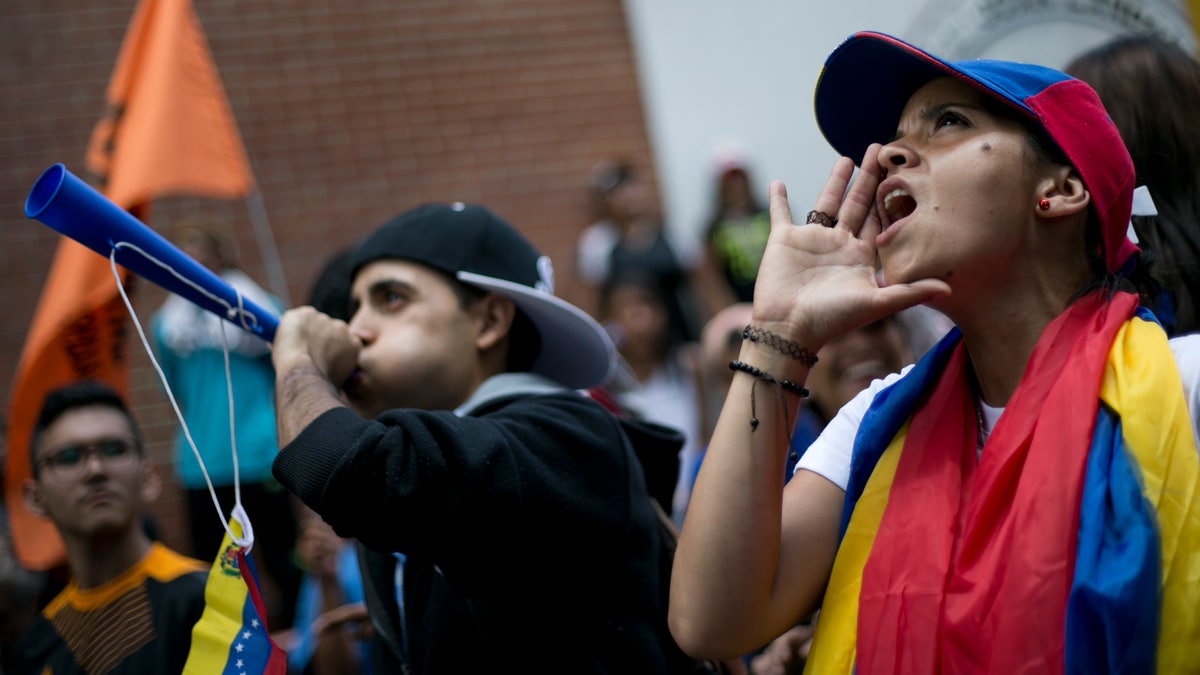
Demonstrators shout slogans against Venezuela's President Nicolas Maduro in Los Teques on the outskirts of Caracas, Venezuela, Wednesday, Sept. 7, 2016. Venezuelans are marching in cities across the country to demand authorities allow a recall referendum against Maduro to go forward this year. (AP Photo/Ariana Cubillos) (ap)
Caracas, Venezuela – Many of the around 10,000 people who live in Villa Rosa, the town in Margarita Island where Venezuelan President Nicolas Maduro was received by angry pot-banging protesters Friday, now fear that the government will retaliate against them.
Their main concern is that they will see their already depleted food supply cut further.
In the days since the protest, Villa Rosa residents says they have been harassed and threatened repeatedly by police, military personnel and government loyalists from mainland Venezuela.
On Wednesday night, opposition leader Henrique Capriles said he was harassed in the Margarita Island airport for four hours by armed and hooded government supporters.
In one grainy video, a small group of people can be seen banging on a glass wall and holding a sign reading "Capriles: Get out of Margarita." But while Capriles said they were armed, no weapons could be seen in the video.
The tense standoff ended after midnight, the AP reported.
“Every day [since Maduro's visit last Friday], outsiders identified with the government or its political party have passed through town in motorcycles and other vehicles scaring neighbors,” said Luis Emilio Rondon, an opposition lawmaker, to Fox News Latino.
The highly touristic Margarita Island is situated off the northeastern coast of the country, in the Caribbean Sea.
On Monday, five men were arrested and charged with possession of material that could potentially be used in future protests.
“We found 10 homemade bombs, 10 tires and two containers of gasoline,” said Aquilino Mata, head of the National Guard in Margarita, after the arrests. “We will continue investigating because these men are not acting alone,” he added.
But the opposition argues that these materials were “planted.”
“The government has activated a plan to try to scare the community,” said lawmaker Jony Rahal, also from the opposition.
“They are coming up with false evidences to link these young men to opposition political leaders from Margarita. They want to denounce another alleged conspiracy against the government,” Rahal told FNL.
Three of the five arrested were released on Tuesday because they were minors, while the other two are still being held in a facility controlled by the National Guard.
Dozens of other harassment reports have been made since the weekend.
On Saturday, police and military forces inspected different homes and interrogated residents about the protest.
“They checked cellphones and deleted pictures and videos of the act. They don’t want to understand that it was a spontaneous event,” Rahal insisted.
Neighbors are increasingly worried about the possibility that Caracas will reduce or stop the distribution of food to Villa Rosa — especially now that the government has put in place a food allocation system controlled by party loyalists known to have discriminated against anti-Chavistas in the past.
“Some people have been told that they won’t deliver food here anymore because we disrespected the president,” Luis Yury, a Villa Rosa resident, told FNL.
He explained that food shipments to the island arrive every month and that, since the last delivery was 15 days ago, it will take some time to see if the threat is real.
“We will be watching the situation closely, but until now we don’t have any official information about the food delivery,” Rondon added.
Both congressmen think that the government’s defensive reaction to Maduro’s unwelcome visit is linked to the fact that next week more than a dozen heads of state are expected in Margarita for the 17th Summit of the Non-Aligned Movement — a group of countries not formally aligned with any major power bloc that includes Iran, Syria, Ecuador and Cuba.
“They are trying to hide the problems that people in Margarita and Venezuela face every day. To accomplish that they are spending at least 120 million euros to import food and repair the island’s infrastructure,” Rahal said.
Among the most notable additions to the island is a traffic circle that features a statue of late President Hugo Chavez.
“It is incredible that the government is willing to spend so much money in a summit while the country starves and people don’t even have medicines,” Rondon told FNL.
In social networks Venezuelans are criticizing the Chavez statue heavily, even comparing it to the one of Saddam Hussein that U.S. forces famously took down in 2003.
Includes reporting by The Associated Press.
